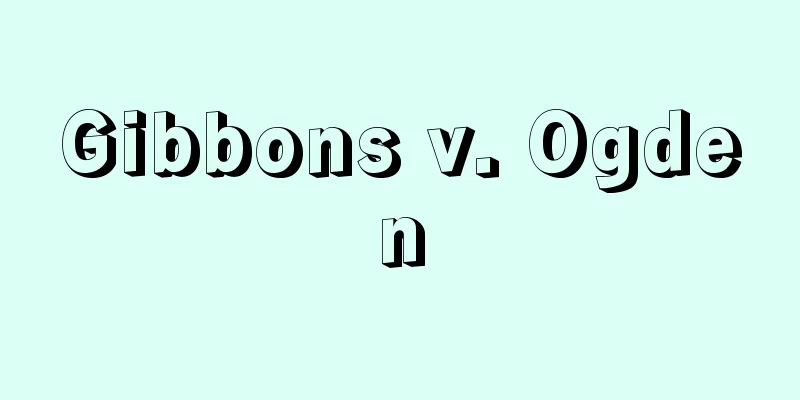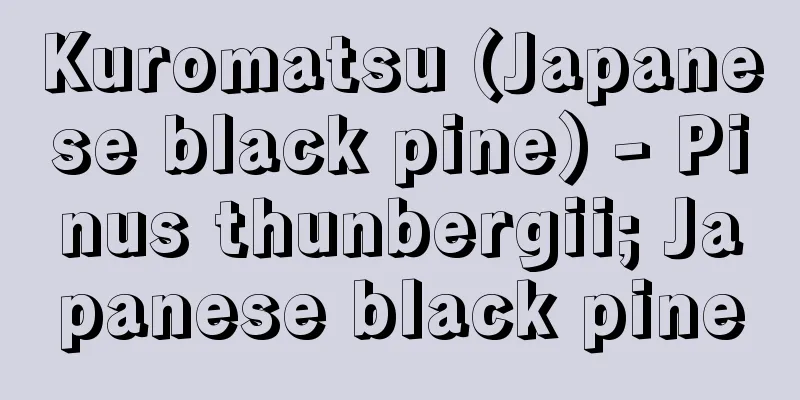Kyoto University Incident - Sibling Incident

|
These are incidents that occurred at Kyoto Imperial University and Kyoto University and concerned academic freedom and university autonomy, and refer to the prewar Sawayanagi Incident and Takikawa Incident, as well as the postwar incidents. [Nomaru Sato] Sawayanagi IncidentIn 1913 (Taisho 2), Sawayanagi Masataro became president of Kyoto Imperial University from his previous position as president of Tohoku Imperial University. In July of that year, shortly after assuming his position, under the pretext of university reform and eradicating stagnation, he unilaterally, without consulting the faculty council, forced seven professors from the humanities, medicine, and science and engineering departments, including Professor Tanimoto Tomeri of education, to submit their resignations. This arbitrary and arbitrary approach led to criticism within the university, as it violated the university's autonomy and ignored academic independence. On January 14 of the following year, over 40 professors from the law school, who were the most strongly opposed, submitted their resignations, and students supported them. Classes were suspended for several dozen days, as compared to the previous year. As a result, on January 24th, the faculty received a memorandum from the Minister of Education, Okuda Yoshito, stating that "It is both reasonable and safe for the president to reach an agreement with the faculty council in the exercise of his official authority regarding the appointment and dismissal of professors," and Sawayanagi's dismissal was issued in April, and the system of mutual election of the president was also confirmed. As a result of this incident, it became customary for the faculty council to have the authority to appoint and dismiss professors. [Nomaru Sato] Takikawa IncidentIn 1932 and 1933 (Showa 7 and 8), the suppression of the Communist Party and other left-wingers became extremely severe, and with the outbreak of incidents such as the Communist Judicial Officials Incident, the brunt of the suppression was gradually directed at liberals as well. Right-wing groups such as Genri Nihonsha were at the forefront, attacking liberal professors at the Imperial University as "Communist professors," and one such person was Kyoto University Law Faculty professor Takigawa Yukitoki, who was singled out for criticism. The first problem was Takigawa's lecture in October 1932, "The Punishment Ideas Appearing in Tolstoy's 'Resurrection'," and the Ministry of Education conveyed this to Kyoto University, stating that his critical rhetoric of the state was inappropriate. Then, in March 1958, at the 64th Diet, Miyazawa Yutaka of the Seiyukai Party used Takigawa's book "Criminal Law Reader" as an example to ask Education Minister Hatoyama Ichiro about his intention to crack down on communist professors. Hatoyama replied that he intended to crack down on them. Soon after, the Ministry of Education also put "Criminal Law Reader" on the table, criticizing its objectivist theory of criminal law as leading to denial of the state, and later attacking its explanation of the crimes of treason and adultery as dangerous. On April 10, Takigawa's "Criminal Law Reader" and "Criminal Law Lectures" were banned by the Minister of Home Affairs, and the Ministry of Education responded by demanding Takigawa's resignation. The Faculty of Law professors' council refused, but on May 25, the Ministry of Education held a committee on the conduct of senior civil servants and unilaterally decided to suspend Takigawa's position. The next day, the Faculty of Law faculty submitted their resignation to President Shigenao Konishi in protest of the violation of academic freedom and university autonomy. Students from the Faculty of Law and other faculties held a student conference to declare their support for the Faculty and protest to the Ministry of Education, and boldly launched a campaign by visiting professors to encourage them, appealing to other universities and citizens, and directly protesting to the Minister of Education. Students from universities all over the country responded to this, and public opinion supported the Faculty of Law at Kyoto University and criticized the Ministry of Education. However, after President Konishi resigned on June 14, seven professors remained due to a strategy of division under the new President Matsui. In the end, seven professors, including Takikawa, Soichi Sasaki, Hideo Miyamoto, and Hiroshi Suekawa, four associate professors, and eight lecturers, assistants, and assistants resigned. The student organization was also crushed by the repression of the police and university authorities, and the campaign ended in defeat. After this incident, organized resistance became impossible. [Kenzo Kitagawa] PostwarNotable incidents after World War II include the Kyoto University Hospital Women's School of Welfare incident, the Emperor incident, and the Takigawa President injury incident. (1) Kyoto University Hospital Affiliated Women's School of Welfare (Nursing School) Incident On April 28, 1949, nurses went on a hunger strike over the issue of not hiring graduates. After the strike was lifted, they went on hunger strike again, and on May 18, the first postwar police officers were introduced. (2) The Emperor Incident On November 12, 1951, the Kyoto University Student Self-Governing Association welcomed the Emperor on his visit to the university by singing a "Song of Peace" and attempted to submit an "Open Letter of Inquiry" to the Emperor regarding the issue of rearmament. As a result, police officers were brought onto campus, and the association was dissolved on the 15th, and eight of its executive committee members were disciplined. (3) Incident in which President Takikawa was injured On June 3, 1954, a conflict arose between the reconstituted student association and the university authorities over plans for the anniversary festival. A student injured President Takikawa Yukitatsu during a protest. The case was brought to court as an assault case, and the student association was dissolved on the 5th. [Nomaru Sato] "A History of the Japanese Student Social Movement" by Takakuwa Suehide (Aoki Bunko)" ▽ "Takigawa Yukitatsu's "Torrent" (1963, Kawade Shobo Shinsha)" ▽ "Liberalism" edited by Tada Michitaro (Modern Japanese Thought Series 18, 1965, Chikuma Shobo)" ▽ "A History of Nursing Twenty Years, edited by the Editorial Committee for the History of Twenty Years (1967, Medical Friend)" ▽ "A History of Kyoto University Seventy Years, edited by the Editorial Committee for the History of Kyoto University Seventy Years (1967, Kyoto University)" ▽ "Excavating Showa History 6" by Matsumoto Seicho (Bunshun Bunko)" ▽ "Contemporary History Materials 42: Thought Control" (1976, Misuzu Shobo) ▽ "A History of the Kyoto Imperial University Student Movement, edited by the Kyoto Imperial University Student Movement History Publication Committee (1984, Showado)" [References] | |Source: Shogakukan Encyclopedia Nipponica About Encyclopedia Nipponica Information | Legend |
|
京都帝国大学、京都大学で起こった学問の自由、大学の自治にかかわる事件で、戦前の沢柳(さわやなぎ)事件、滝川(たきかわ)事件、および戦後の事件をいう。 [佐藤能丸] 沢柳事件1913年(大正2)、東北帝大総長より京都帝大総長となった沢柳政太郎は、就任まもない7月に大学改革と沈滞一掃を名目にして、教授会に諮らず独断で、教育学の谷本富(とめり)教授ら文・医・理工系7教授に辞表を提出させた。その独断専行的なやり方に対して、大学の自治を破り学問の独立を無視するものとして、学内より批判行動が起こった。翌年1月14日には、もっとも強く反対していた法科大学教授陣四十数名が辞表を提出し、学生たちもこれを支援した。休講は前年より数十日間も続いていた。結果は、ついに1月24日、教授陣は奥田義人(おくだよしと)文相より「教授ノ任免ニツイテハ総長カ職権ノ運用上教授会ト協定スルハ差支ナク且(か)ツ安全ナリ」との覚書を得、4月に沢柳の免官が発令され、総長互選制も確認された。この事件により、以後、教授会が教授任免に関する権限を慣行的に有するようになった。 [佐藤能丸] 滝川事件1932、33年(昭和7、8)には、共産党をはじめ左翼への弾圧は苛烈(かれつ)を極め、司法官赤化事件などが起こるなかで、弾圧の矛先はしだいに自由主義者にまで向けられるに至った。右翼団体原理日本社などはその尖兵となって自由主義的な帝大教授を「赤化教授」と攻撃、京大法学部教授滝川幸辰(ゆきとき)もその1人として槍玉(やりだま)にあげられていた。最初は32年10月の滝川の講演「トルストイの『復活』に現れた刑罰思想」が問題にされ、国家批判的言辞が不穏当だとして文部省から京大に伝えられた。ついで33年3月の第64議会で政友会の宮沢裕(ゆたか)が、滝川の著書『刑法読本』を例にとり、文部大臣鳩山(はとやま)一郎に赤化教授取締りの決意をただしたのに対し、鳩山は取り締まる方針だと答えた。その直後から文部省も『刑法読本』を俎上(そじょう)にのせ、その客観主義刑法理論は国家否認につながると批判、さらにその後、内乱罪と姦通(かんつう)罪の説明が危険だとして攻撃を加えた。4月10日に滝川の『刑法読本』と『刑法講義』が内務大臣によって発禁処分にされると、文部省はこれを受けて滝川の辞任を要求した。法学部教授会はこれを拒否したが、文部省は5月25日高等文官分限委員会を開いて滝川の休職を一方的に決定した。翌日、法学部教授会は学問研究の自由と大学の自治の蹂躙(じゅうりん)に抗議して、一同小西重直(しげなお)総長に辞表を提出した。法学部をはじめ各学部の学生は学生大会を開いて教授会支持と文部省への抗議を声明し、教授を歴訪激励、他大学および市民へのアピール、文部大臣への直接抗議を行うなど果敢に運動を展開した。全国各大学の学生もこれに呼応する動きをみせ、世論も京大法学部を支持、文部省を批判した。しかし6月14日の小西総長辞職後、松井新総長の下での切り崩し策によって7名の教授が残留、結局、滝川、佐々木惣一(そういち)、宮本英雄、末川博(すえかわひろし)ら7名の教授と助教授4名、講師・助手・副手8名が辞職、学生の組織も警察と大学当局の弾圧によってつぶされ、運動は敗北に終わった。この事件を最後に組織的抵抗運動はもはや不可能となった。 [北河賢三] 戦後第二次世界大戦後の著名な事件としては、京大病院附属厚生女学部事件、天皇事件、滝川総長負傷事件がある。 (1)京大病院附属厚生女学部(看護婦学校)事件 1949年(昭和24)4月28日、卒業生の不採用問題から看護婦がハンストに入り、いちおう解除ののちふたたびハンストに突入し、5月18日戦後初の警察官導入が行われた。 (2)天皇事件 1951年(昭和26)11月12日、京大全学生自治組織の同学会は、天皇の来学に際し「平和の歌」で迎え、再軍備問題につき天皇に「公開質問状」を提出しようとした。このため学内に警察官が導入され、これを契機に15日同学会は解散され、執行委員8名が処分された。 (3)滝川総長負傷事件 1954年(昭和29)6月3日、創立記念祭の計画をめぐり、再建されていた同学会と大学当局が対立し、学生が滝川幸辰総長に抗議中負傷を負わせたというもので、暴行事件として法廷に持ち込まれ、5日には同学会が解散された。 [佐藤能丸] 『高桑末秀著『日本学生社会運動史』(青木文庫)』▽『滝川幸辰著『激流』(1963・河出書房新社)』▽『多田道太郎編『自由主義』(『現代日本思想大系18』1965・筑摩書房)』▽『看護二十年史編集委員会編『看護二十年史』(1967・メヂカルフレンド社)』▽『京都大学七十年史編集委員会編『京都大学七十年史』(1967・京都大学)』▽『松本清張著『昭和史発掘6』(文春文庫)』▽『『現代史資料42 思想統制』(1976・みすず書房)』▽『京都帝国大学学生運動史刊行会編『京都帝国大学学生運動史』(1984・昭和堂)』 [参照項目] | |出典 小学館 日本大百科全書(ニッポニカ)日本大百科全書(ニッポニカ)について 情報 | 凡例 |
<<: Brotherhood of Faith - Kyodai Shinjinkai
>>: Brothers Cup - Brothers Cup
Recommend
Harita
…The Scandinavian words for green, such as green ...
Académie Goncourt
Founded in 1902 with funds from the legacy of the ...
《Zeitschrift für Sozialforschung》 (English notation) Zeitschriftfur Sozialforschung
...A general term for a group of thinkers who wer...
Osaka swelling - Osakabare
...This period coincides with the time when the J...
Pylades (English spelling)
…(3) Daughter of King Agamemnon of Mycenae and hi...
Peasant Liberation - Nouminkaiho
Peasants are liberated from feudal rent and become...
Neighborhood relations (English spelling) Nachbarverhältnis German
Legal relations between adjacent real estate owne...
Gmunden (English spelling)
A city in Upper Austria in northwestern Austria. I...
Daie Soko - Daie Soko
A Zen monk of the Rinzai sect in the Song dynasty...
Shirataka [town] - Shirataka
A town in Nishiokitama County in the central south...
Isonomia - Isonomia
…In fact, both Christianity and Stoic thought hav...
Cherkessk
Batalpashinsk until 1937. Capital of the Karachay-...
Scintigram
A radioisotope (RI) or its labeled compound is adm...
One-room shrine
A small-scale main shrine hall with a single space...
Glacial erosion
...The groundwater table in the area falls within...









